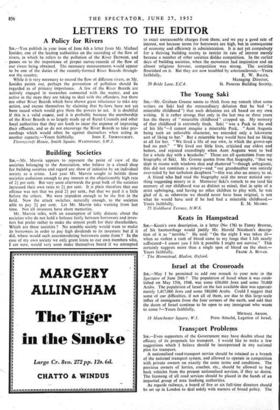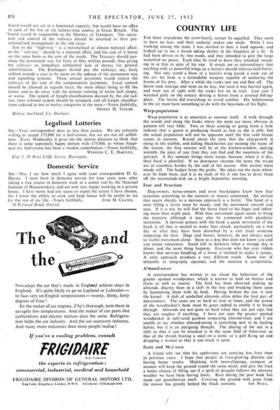Transport Problims
Srn,—Even supporters of the Government may have doubts about the efficacy of its proposals for transport. I would like to make a few suggestions which I believe should be incorporated in any national plan for transport.
A nationalised road-transport service should be retained as a branch of the national transport system, and allowed to operate in competition with private owners on exactly the same terms and conditions. The previous owners of lorries, coaches, etc., should be allowed to buy back vehicles from the present nationalised services, if they so desire. The licensing of all road services should be placed in the hands of an impartial group of area licensing authorities.
As regards railways, a board of five or six full-time directors should be set up in London to deal solely with matters of broad policy. The
board would not act in a functional capacity, but would have an office in each of the five or six railway-area centres in Great Britain. The ',board would be responsible to the Ministry of Transport. 'The opera- tion and control of the railways should be returned to their pre- nationalised management in the old areas.
Just as the " high-way " is a nationalised or almost national affair, so the " rail-way " should be a national affair, and the cost of it borne on the same basis as the cost of the roads. The Treasury should pur- chase the permanent way for forty or fifty million pounds, thus giving the railways an immediate substantial sum of money for general rehabilitation. The Exchequer should pay the railways, say, forty million pounds a year to be spent on the upkeep of the permanent way and signalling systems. These annual payments would relieve the railways of the cost of the compensation payments. Local control should be allowed as regards fares; the main object being to fill the trains, and to do away with the present running of trains half empty, or worse. The system of freight-classifications decreed by the old rail- way rates tribunal system should be scrapped, and all freight classifica- tions reduied to ten or twelve categories at the most.—Yours faithfully, Bishop Auckland, Co. Durham.
ERNEST H. TAYLOR.



































 Previous page
Previous page